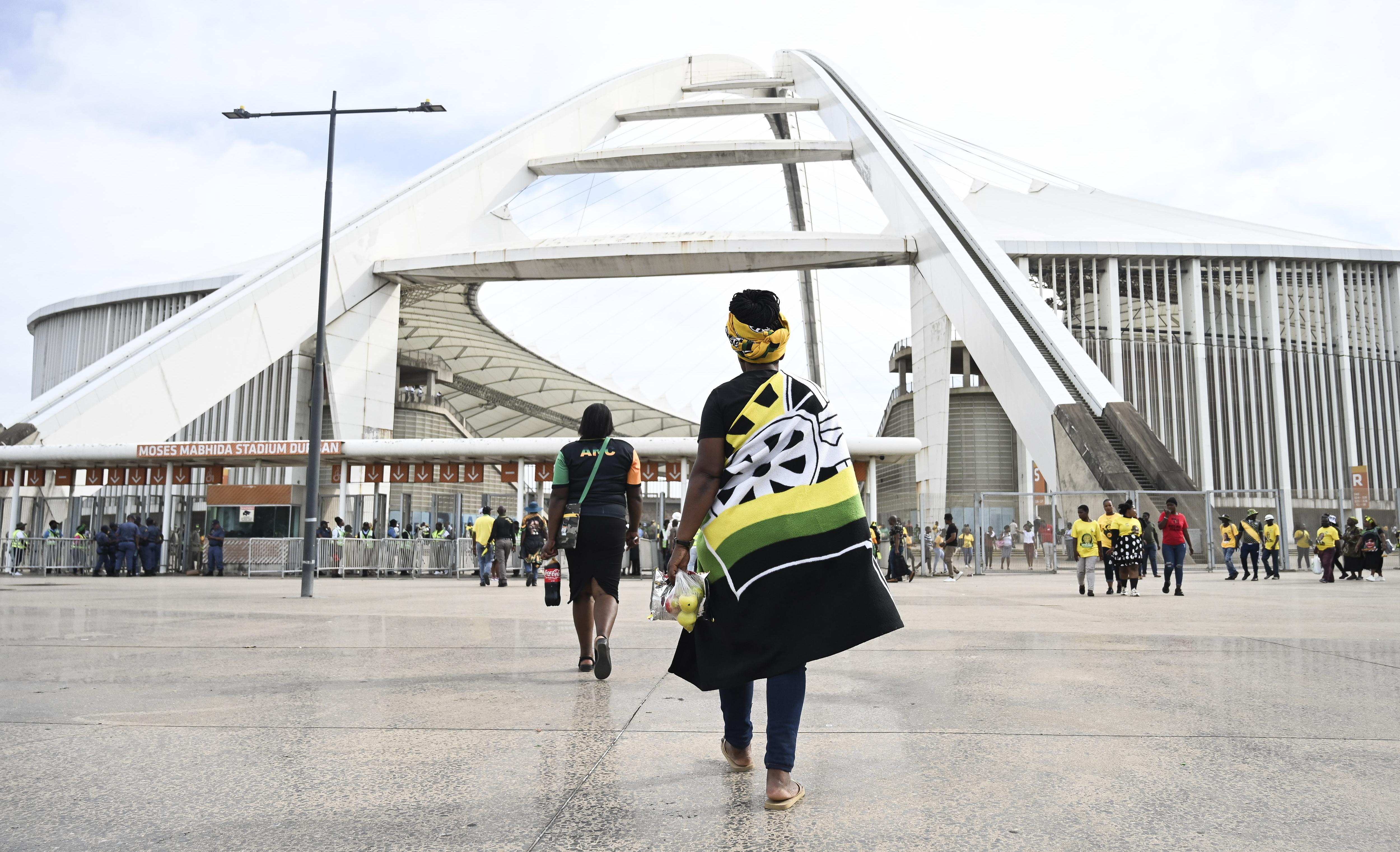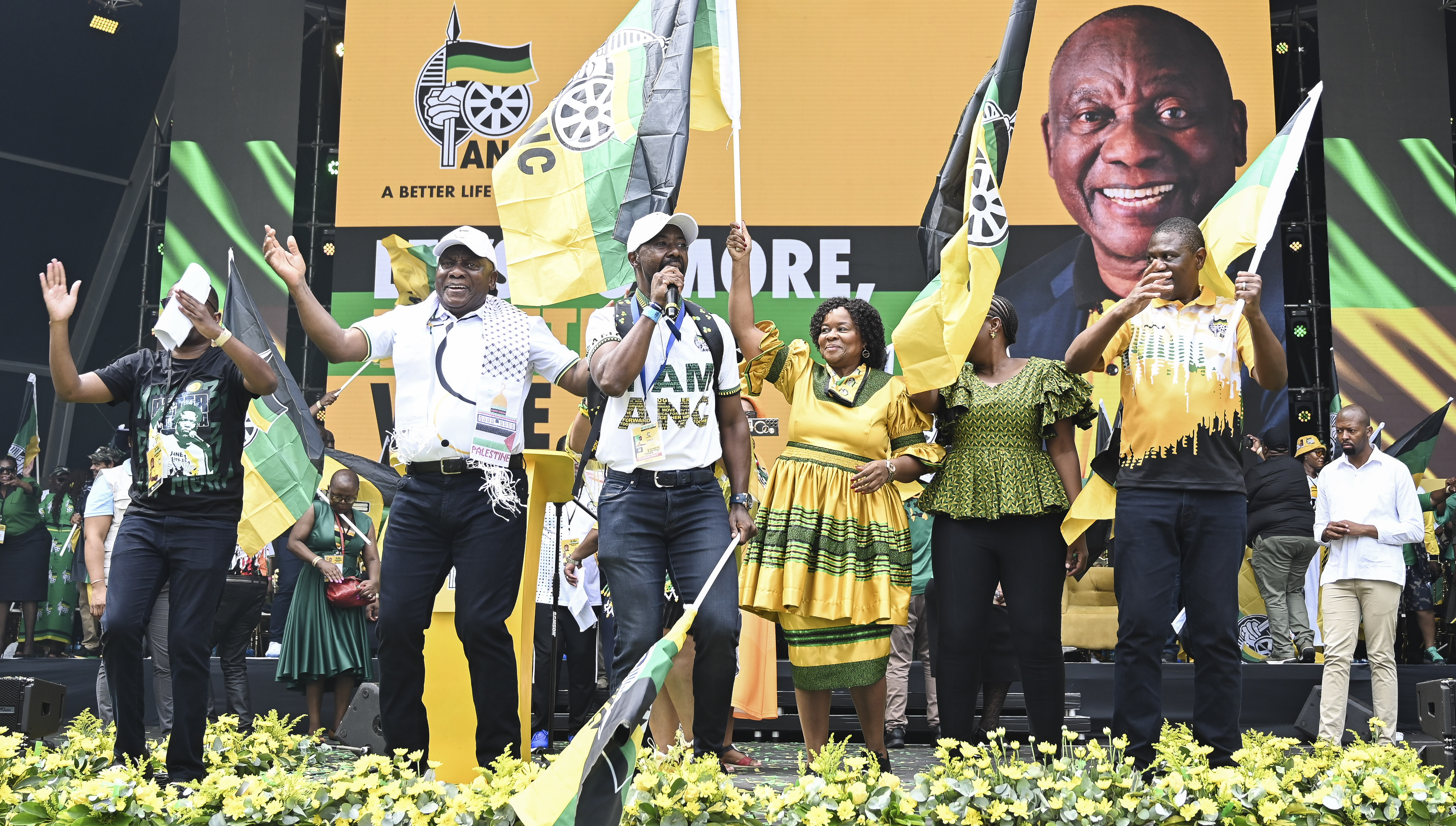As the ANC fights its most challenging election in 30 years, the governing party has promised to create 3.5 million work opportunities in the next five years if it wins the May 29 election. Jobs are Issue Number One for South African voters, the largest poll has shown.
The party wants to direct investment assets into its growth and plans. It says it will “Engage and direct financial institutions to invest a portion of their funds in industrialisation, infrastructure development and the economy, through prescribed assets”, the manifesto says. It also wants to capitalise on a sovereign wealth fund, although the budget deficit and state debt are at their highest levels.
Prescribed assets, a sovereign wealth fund and an incursion of the state in monetary policy (the remit of the independent SA Reserve Bank) have been written into several ANC manifestos, but have yet to be implemented. The party also again promises more land expropriation without compensation.
It says it will “align macroeconomic policy with economic and social priorities” in the manifesto, including interest and exchange rates. The SA Reserve Bank sets interest rates, while the markets set the foreign exchange rate of the rand.”
 The ANC’s election manifesto launch at Moses Mabhida Stadium on 24 February 2024 in Durban, South Africa. (Photo: Gallo Images / Darren Stewart)
The ANC’s election manifesto launch at Moses Mabhida Stadium on 24 February 2024 in Durban, South Africa. (Photo: Gallo Images / Darren Stewart)
Cyril’s employment agency
President Cyril Ramaphosa is now the country’s biggest employer because of his presidential employment stimulus and wants to increase his workforce. The signature pledge for the party facing a jobs crisis election is to boost his employment plan by 2.5 million opportunities, says the party’s manifesto released on Saturday, February 24.
The party says an additional 1 million jobs will come from incentives for small enterprises, entrepreneurs, and co-ops, especially in towns or villages.
“…1.2 million young people each year join the labour market. Around 3.4 million young people are not in employment, education or training, and 4.9 million people between 18 and 35 years old are unemployed,” the manifesto states.
More state banks
The ANC also wants to start a “public banking sector” by creating more banks for specific sectors and a “public retail banking system”. The party will “mobilise additional domestic and international resources to support priorities including through progressive tax reforms and other measures”. The Postbank, the country's largest state-owned bank, is in a perennial crisis; provincial banks like VBS Bank (Limpopo) and Ithala Bank (KZN) have been beset by serial corruption crises.
 Supporters arrive at the African National Congress election manifesto launch at Moses Mabhida Stadium on 24 February 2024 in Durban, South Africa. (Photo: Gallo Images / Darren Stewart)
Supporters arrive at the African National Congress election manifesto launch at Moses Mabhida Stadium on 24 February 2024 in Durban, South Africa. (Photo: Gallo Images / Darren Stewart)
‘ANC leaders care only about themselves.’
The ANC is on the ropes, with polls predicting its worst election outcome. In 1994, the ANC won 62% of the vote, but three opinion polls now predict it either will not get a majority or just about scrape over 50% on May 29. (New research says the party can get 53%, but it has yet to be public.)
The governing party responds with a mea culpa to the misery in its core loyal voters who are either not voting or turning to other parties, including the EFF and Action SA.
“The hardship and suffering of many have led them to believe that ANC leaders care only about themselves, that we are soft on corruption, and that we do not care about the suffering of ordinary people.
“We admit we made mistakes as the ANC, with some members and leaders undermining institutions of the democratic state and advancing selfish personal interests.
“Now the ANC is working hard to restore trust and confidence … We are now raising the intellectual capacity and enhancing the moral and ethical orientation of our membership,” the party says.
There is a roiling debate in the ANC on whether or not members named in the Commission of Inquiry on State Capture for further investigation toward possible prosecution should be put on party election lists. On Saturday, February 24, Ramaphosa said only clean members of the party (those who could get through “the eye of the needle” – the party’s biblical shorthand for integrity) would get on to its candidate lists.
Dealing with hunger and poverty
The party also wants to increase the basket of VAT-exempt foodstuff, and support community and home gardens to boost food security. About 30% of South Africans suffer from hunger. Ramaphosa said a future government would attack price-fixing, which worsened the cost of living crisis. The national minimum wage would continue to increase.
While the ANC has not yet committed to a basic income grant, the manifesto says it will “Progressively implement a basic income support grant by extending and improving the value and coverage of SRD [social relief of distress] grant for the unemployed”.
On energy security, the party only devotes one line despite load shedding being one of its biggest challenges and a factor dragging down its support. It promises to “Promote cheaper and subsidised solar power”. The government will install rooftop solar panels in poor areas.
The ANC also highlights a “National Oil company” so the state can build its petroleum refining capacity. President Cyril Ramaphosa said SA was going through a “challenging time” but said investment in energy, road and rail infrastructure would end load shedding.
The ANC will use public works employees to “fix potholes, pave roads, and maintain community and rural roads, as well as other road infrastructure”. The ANC also wants to strengthen the taxi industry through formalisation and wants to “move towards’ subsidising taxi commuters.
The manifesto says the National Health Insurance (NHI) will be implemented over five years, but this week’s budget only allocates R1.4-billion to the NHI plan.
At total cost, the NHI envisages a budget of R600-billion a year, pooling the public and private health expenditures. Ramaphosa said the NHI Bill on his desk would be signed.
Nothing new on crime and corruption
Despite crime and corruption being one of the most pressing issues for the governing party, there is nothing new in its pledges, but rather a continuity of existing policies.
The party says it will “strengthen the SAPS Economic Infrastructure Task teams” to deal with entrenched organised syndicates. It again promises data and evidence-based policing, as well as a focus on gang violence and cash-in-transit heists. The manifesto says there will be more “frontline police officers”.
The party will continue strengthening the National Prosecuting Authority, reviewing the Criminal Procedures Act, reducing backlogs and delays, and supporting the Legal Aid Board.
The party again promises more rigorous lifestyle audits, improved vetting, and real-time audits of critical projects, and says it will strengthen anti-corruption bodies. “We have to treat corruption as a crime against our people,’ said Ramaphosa.
A tough approach to illegal immigration
As immigration becomes a hot-button topic on different campaign trails, the usually laissez-faire ANC turns tough.
It highlights the ongoing overhaul of three significant pieces of migration legislation, and says that refugee and asylum centres should be placed closer to border posts. The party pledges to “Regulate employment of foreign workers … to give preference to South African jobseekers, and act against employment and exploitation of undocumented persons”. It also promises to simplify visa applications.
Responding to cadre deployment
The DA has placed cadre deployment and its impact on the developmental state on the agenda, and the ANC manifesto responds to this.
“The ANC has strengthened the selection criteria for public representative candidates, prioritising skills, educational knowledge, experience and integrity,” Ramaphosa said the DAs were hypocrites in the policy. In the past few days, former members of the DA have revealed that the opposition party deploys similar policies as Rebecca Davis reported here.
How does the ANC manifesto compare with two other party manifestos released?
The ANC manifesto is more grounded in accurate data than the EFF voter pledge, which uses incorrect information to make populist promises. It is progressive but more conservative on migration than in the past. The manifesto, like the EFF’s, is built on state power as a driver of its election promises. Both parties focus on the black majority and how to empower and employ young people.
The DA manifesto scrubs black empowerment (BEE) from its pledges to voters, and its focus on crime and corruption is stronger than the ANC’s. The DA focuses on employment through growth, while both the ANC and EFF target the state as the employer or jobs driver. The DA manifesto is more private sector-friendly than the ANC manifesto. DM




 People arrive at the African National Congress (ANC) Election Manifesto Launch at Moses Mabhida Stadium on February 24, 2024 in Durban, South Africa. The manifesto launch provided a platform for the ANC to outline its plans for the 2024 national and provincial polls. (Photo by Gallo Images/Darren Stewart).
People arrive at the African National Congress (ANC) Election Manifesto Launch at Moses Mabhida Stadium on February 24, 2024 in Durban, South Africa. The manifesto launch provided a platform for the ANC to outline its plans for the 2024 national and provincial polls. (Photo by Gallo Images/Darren Stewart). 